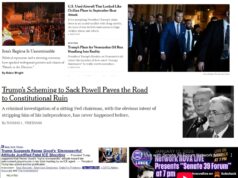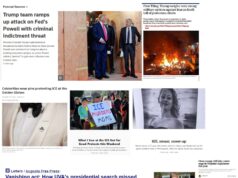The following is from a good friend of mine, Yosem Companys, who is from Puerto Rico and who also used to be friends with/mentor to Ricardo Rossello, now Governor of Puerto Rico. Yosem, who I first met in 2003 when he was working on the Wesley Clark for President campaign, is one of the smartest people I know and certainly has a lot of insight into what the heck happened with Ricardo “Ricky” Rossello, who is now in the middle of a scandal over corruption and lewd texts, and is being pressed to resign. So yeah, this isn’t directly Virginia-related, but I think it deserves wide readership.
My Stanford colleague Phil Zimbardo wrote in “The Lucifer Effect: Understanding How Good People Turn Evil,” “If you put good apples into a bad situation, you’ll get bad apples.”
I believe that’s what happened to my once mentee and now Governor Ricardo Rossello (or Ricky, as I knew him) during the past decade.
As Ricky’s mentor, I helped him secure and supervised him at his 1st job in national politics.
Later, as Ricky’s one-time business partner, I coached and advised him when he founded his first and only Silicon Valley startup.
Ricky seemed like a good egg.
Most would agree that Ricky was dealt a good hand in life: He came from a prominent Puerto Rican family. His father had become Governor of Puerto Rico. He went to a good school. He seemingly had a good life.
At the same time, however, Ricky never had to take responsibility for any of his actions over the course of his life because his parents — and everyone else for that matter — always rescued him at the first sign of trouble.
Unlike most, I always felt sorry for Ricky for — unlike his older brothers Luiso Rossello and Jay — he had grown up for the most part only knowing his father as Governor. Growing up as the Governor’s son means he had no perspective when picking his friends because most of these so-called “friends” were so as a result of their having ingratiated themselves to him.
Ricky’s parents saw Ricky as the most brilliant member of the family, albeit an absent minded one, and Ricky didn’t want to disappoint them. I witnessed firsthand how the pressure to seem perfect at all times in the eyes of others led Ricky to develop a need for adulation, a penchant for secrecy, a compulsion to lie to save face, and a tendency to blame and lash out at others (including me) whenever he made a mistake in public.
Ricky’s reaction to criticism, even when delivered constructively, was to vilify the source. Meanwhile, his so-called “friends” were always champing at the bit to encourage Ricky to throw his critics under the bus just so they could climb on his pecking order. As a result, Ricky tended to purge those who had the greatest potential to enable his personal growth and development and instead tended to surround himself with “yes men” who inhibited it. This also means Ricky trapped himself in a bubble of his own making. This was no team of rivals.
In contrast to people’s beliefs that human personalities are encoded in genes, social psychologists have long shown that situational effects are much more powerful. As Phil wrote in his book, “each of us has the potential, or mental templates, to be saint or sinner, altruistic or selfish, gentle or cruel, submissive or dominant, sane or mad, good or evil. Perhaps we are born with a full range of capacities, each of which is activated and developed depending on the social and cultural circumstances that govern our lives.”
Of course, the passage above is not meant to condone Ricky’s behavior in the present scandal as his having simply been a product of circumstance. It is also not meant to free Ricky from his responsibility and accountability for this mess.
As Phil acknowledges, Ricky could have at any moment of his life chosen a different path — that of the hero: “Heroes are those who can somehow resist the power of the situation and act out of noble motives, or behave in ways that do not demean others when they easily can.”
Unfortunately, as Ricky got older, he didn’t get wiser. Instead, Ricky chose a path of evil, which according to Phil “consists in intentionally behaving in ways that harm, abuse, demean, dehumanize, or destroy innocent others—or using one’s authority and systemic power to encourage or permit others to do so on your behalf.”
As the scandal has unfolded, I have often wondered whether there was something I could’ve done to have helped steer Ricky away from such evils and help put him back on the right course. But as the old saying goes: “You can lead a horse to water but you can’t make him drink.”




![Sunday News: “Trump Is Briefed on Options for Striking Iran as Protests Continue”; “Trump and Vance Are Fanning the Flames. Again”; “Shooting death of [Renee Good] matters to all of us”; “Fascism or freedom? The choice is yours”](https://bluevirginia.us/wp-content/uploads/2026/01/montage011126-238x178.jpg)






